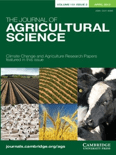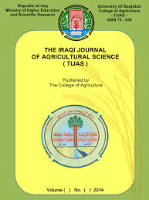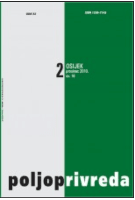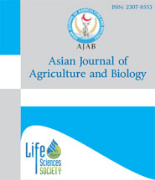
Journal of Tekirdag Agriculture Faculty-Tekirdag Ziraat Fakultesi Dergisi
Scope & Guideline
Pioneering research in agriculture and biological sciences.
Introduction
Aims and Scopes
- Crop Science and Improvement:
Research on the genetic, agronomic, and physiological aspects of crop species, including studies on yield, quality, and adaptation to environmental stresses. - Soil Science and Fertility Management:
Investigations into soil properties, nutrient management, and the impact of various amendments on soil health and crop productivity. - Animal Husbandry and Livestock Management:
Studies focusing on livestock breeding, nutrition, management practices, and the economic aspects of animal farming. - Food Technology and Safety:
Research on food processing, preservation techniques, and the evaluation of food safety and quality, including the development of new food products. - Sustainable Agriculture and Environmental Impact:
Exploration of sustainable agricultural practices, impact assessments of agricultural activities on the environment, and strategies to mitigate negative effects. - Agricultural Engineering and Technology:
Innovations in agricultural machinery, irrigation systems, and technologies that enhance agricultural productivity and efficiency.
Trending and Emerging
- Climate Change Adaptation in Agriculture:
Research examining how agricultural practices can be adapted to mitigate the effects of climate change, including studies on crop resilience and adaptive strategies. - Precision Agriculture and Technology Integration:
The integration of technology in agriculture, such as the use of drones, sensors, and data analytics for optimizing farming practices, is increasingly prevalent. - Organic Farming and Sustainable Practices:
A growing emphasis on organic farming methods and sustainable agricultural practices, reflecting consumer demand for eco-friendly products. - Functional Foods and Nutraceuticals:
Research into the development of functional foods and the health benefits of various agricultural products is on the rise, responding to public interest in nutrition. - Biological Control and Integrated Pest Management:
A trend towards research on biological pest control methods and integrated pest management strategies as alternatives to chemical pesticides. - Socioeconomic Aspects of Agriculture:
Increasing investigations into the socioeconomic factors influencing agricultural practices, including farmer behavior, market dynamics, and policy impacts.
Declining or Waning
- Traditional Pest Control Methods:
Research on conventional pest management strategies has diminished, possibly due to the increasing focus on integrated pest management and biological control alternatives. - Basic Agronomy Practices:
While foundational agronomic studies remain important, there is a noticeable decline in basic agronomy research as the focus shifts towards more specialized and applied studies. - Non-Scientific Agricultural Practices:
Research related to traditional farming practices without scientific backing appears to be decreasing as evidence-based approaches gain traction. - Historical Agricultural Studies:
Investigations into historical agricultural practices or historical data analysis are becoming less frequent, as contemporary challenges take precedence.
Similar Journals

Journal of Agriculture and Food Research
Championing Open Access in Agricultural and Food ResearchJournal of Agriculture and Food Research, published by ELSEVIER, is a premier Open Access journal that has made significant strides in the fields of agricultural and biological sciences since its launch in 2019. With an ISSN of 2666-1543, the journal is headquartered at Radarweg 29, 1043 NX Amsterdam, Netherlands. It holds a remarkable position in the 2023 Category Quartiles, achieving Q1 rankings in Agricultural and Biological Sciences (miscellaneous), Agronomy and Crop Science, and Food Science. The journal's impactful research is reflected in its impressive Scopus ranks, including a ranking of #25 in Agricultural and Biological Sciences, showcasing the journal's commitment to high-quality, innovative research relevant to contemporary agricultural challenges. Researchers, professionals, and students can benefit from its diverse array of published works, fostering a greater understanding of food security, sustainable agriculture, and innovative food technologies. By embracing an open access model, the journal ensures that critical research is readily available to a global audience, aiming to enhance knowledge dissemination in this vital field.

JOURNAL OF AGRICULTURAL SCIENCE
Exploring the Frontiers of Agronomy and GeneticsJOURNAL OF AGRICULTURAL SCIENCE, published by Cambridge University Press, stands as a pivotal resource in the field of agricultural research. With a rich history dating back to 1905, this esteemed journal has consistently delivered cutting-edge scholarly articles that address pressing issues in agronomy, crop science, animal science, and genetics. Currently holding a Q2 ranking in Agronomy and Crop Science and Animal Science and Zoology, and a Q3 in Genetics, it reflects a robust impact within the academic community, contributing to innovative practices and technologies in agriculture. Indexed in Scopus, its authors benefit from broad visibility, supported by a strong readership among researchers, professionals, and students alike. While the journal does not currently offer open access, its rigorous peer-review process ensures that published works meet the highest scholarly standards, fostering a rich environment for knowledge exchange and advancement in agricultural science.

SCIENTIA AGRICOLA
Empowering research to revolutionize farming techniques.SCIENTIA AGRICOLA is a prestigious, peer-reviewed journal published by UNIV SAO PAULO, ESALQ, dedicated to advancing the field of agricultural sciences. With the ISSN 1678-992X and an e-ISSN maintaining the same number, this Open Access journal has been a valuable resource since 1992, fostering wide dissemination of knowledge and research findings in agriculture. Hailing from Piracicaba, Brazil, associated with one of the leading agricultural universities, SCIENTIA AGRICOLA serves as an essential platform for researchers, practitioners, and students aiming to explore innovative agricultural practices, crop production, and sustainable techniques. Although specific metrics such as H-Index and Scopus Ranks were not provided, the journal's longstanding commitment to open access and impactful research underscores its importance in contributing to the global dialogue on agricultural efficiency and sustainability.

Iraqi Journal of Agricultural Sciences
Nurturing insights that shape the future of farming.The Iraqi Journal of Agricultural Sciences, published by the College of Agricultural Engineering Sciences, University of Baghdad, is a prominent open-access journal that has been disseminating valuable research in the fields of agricultural and biological sciences since 2005. With an ISSN of 0075-0530 and an E-ISSN of 2410-0862, this journal serves as an essential platform for scholars to share their findings and advancements in various disciplines, including animal science, horticulture, and food science. Recognized for its excellence, the journal achieved Q1 ranking in multiple categories, reflecting its significant contribution to the scientific community and its impact within Scopus rankings. It is particularly dedicated to fostering research that addresses local and global agricultural challenges and promotes sustainable practices in Iraq and beyond. As a pivotal resource for researchers, professionals, and students alike, the Iraqi Journal of Agricultural Sciences invites submissions that advance our understanding of agricultural sciences while supporting the open dissemination of knowledge in this vital sector.

Poljoprivreda
Empowering agronomy through open access research.Poljoprivreda is a distinguished open-access journal dedicated to the field of agronomy and crop science, published by the FAC Agriculture Osijek in Croatia. Since its inception in 2000, the journal has been committed to disseminating high-quality research that informs both academic and practical advancements in agriculture. With an ISSN of 1330-7142 and an E-ISSN of 1848-8080, Poljoprivreda provides a vital platform for researchers, professionals, and students to engage with the latest findings and methodologies in agronomy, contributing significantly to the enhancement of agricultural practices in Croatia and beyond. Although currently ranked in the 22nd percentile within its category according to Scopus, the journal aspires to elevate its standing by welcoming innovative research that addresses contemporary challenges within the agricultural sciences. By fostering open access since 2000, Poljoprivreda ensures that its scholarly content is freely available, promoting wider dissemination and collaborative opportunities among researchers globally.

Chilean Journal of Agricultural & Animal Sciences
Fostering collaboration in agricultural research.Chilean Journal of Agricultural & Animal Sciences, published by UNIV CONCEPCION, CAMPUS CHILLAN, serves as a pivotal platform for disseminating innovative research in the agricultural and biological sciences. With an ISSN of 0719-3882 and an E-ISSN of 0719-3890, this journal has established its significance in the academic community, particularly within the realm of agricultural studies in Chile and beyond. As it continues to evolve from 2014 through 2024, the journal is classified in the Q4 quartile for Agricultural and Biological Sciences and ranks 187th out of 221 journals in this category according to Scopus, placing it in the 15th percentile. While currently not an open-access journal, it aims to provide readers with insightful studies and developments that contribute to the understanding of agricultural practices and animal sciences. Researchers, professionals, and students will find invaluable resources here, fostering knowledge transfer and collaboration within this critical field.

Advances in Agriculture
Nurturing Sustainable Practices for Tomorrow's AgricultureAdvances in Agriculture is a prominent Open Access journal dedicated to the dissemination of high-quality research in the fields of agriculture, agronomy, animal science, food science, and soil science. Published by HINDAWI LTD from the United Kingdom, this journal has made significant strides since its inception in 2014, contributing to the advancement of agricultural knowledge and practices. With an impressive impact factor reflected in its tiered quartile rankings, notably Q2 in Agricultural and Biological Sciences (miscellaneous), Agronomy and Crop Science, and Animal Science and Zoology, it serves as a key platform for innovative research and applied science. The journal aims to provide researchers, professionals, and students with rich access to groundbreaking studies that can help shape sustainable agricultural practices and policies. Emphasizing a global audience, Advances in Agriculture promotes an inclusive dialogue among scholars to tackle contemporary challenges in agriculture, enhancing food security and environmental stewardship worldwide.

AgroLife Scientific Journal
Connecting Researchers for a Sustainable Future.AgroLife Scientific Journal, published by the University of Agronomic Sciences and Veterinary Medicine Bucharest, is a distinguished platform for disseminating research within the field of agricultural and biological sciences. Established as an Open Access journal since 2012, it aims to facilitate knowledge sharing and enhance accessibility to vital information in agriculture, veterinary medicine, and related disciplines. With an ISSN of 2285-5718 and E-ISSN of 2286-0126, the journal welcomes innovative research articles, review papers, and case studies that explore contemporary challenges and breakthroughs in the agro-scientific community. It is noteworthy that in the 2023 Category Quartiles, the journal is classified as Q4, reflecting its role in the broader academic landscape, though with significant growth potential as indicated by its Scopus Rank of #152 out of 193. Researchers, professionals, and students can leverage the journal's open access model to remain at the forefront of agricultural research while contributing to a collaborative scholarly conversation.

Agrarforschung Schweiz
Empowering research to tackle contemporary agricultural challenges.Agrarforschung Schweiz is a premier journal dedicated to advancing the fields of agronomy, animal science, food science, and environmental studies. Published by AGRARFORSCHUNG in Switzerland, this journal serves as a vital platform for the dissemination of research findings that address contemporary challenges in agriculture and food systems. With an emphasis on open access, researchers and practitioners are encouraged to share their work, fostering a collaborative environment for knowledge exchange. Although currently listed in Q4 of several agricultural categories, the journal is poised for growth and aims to enhance its impact within the academic community. It features a wide range of topics from innovative agricultural practices to sustainability and pollution management, catering to a diverse audience of researchers, students, and industry professionals. Given the rich agricultural heritage of Switzerland, Agrarforschung Schweiz aspires to contribute meaningfully to global discussions and advancements in agricultural sciences through rigorous peer-reviewed research and insights.

Asian Journal of Agriculture and Biology
Showcasing groundbreaking research for global agricultural and biological progress.Welcome to the Asian Journal of Agriculture and Biology, a premier open access journal published by LIFE SCIENCES SOC PAKISTAN, dedicated to advancing research in the fields of agricultural and biological sciences. Since its inception in 2013, this journal has provided a vital platform for scholars and practitioners to disseminate novel findings and innovative methodologies that contribute to the betterment of agricultural practices and biological research. With an impressive H-Index and ranked in the Q3 category across multiple disciplines including Agricultural and Biological Sciences, Biochemistry, Genetics, and Molecular Biology, as well as Medicine, the journal showcases high-quality research that influences both academic and practical applications globally. The journal is indexed in Scopus, reinforcing its commitment to high academic standards and providing researchers with efficient access to significant knowledge. Based in Pakistan, the Asian Journal of Agriculture and Biology is your gateway to staying abreast of the latest trends and discoveries that support sustainable development and health sciences.